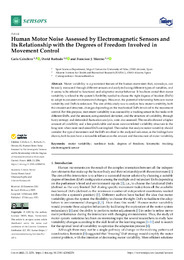Título :
Human Motor Noise Assessed by Electromagnetic Sensors and Its Relationship with the Degrees of Freedom involved in Movement Control |
Autor :
Caballero, Carla 
Moreno, Francisco Javier 
Barbado, David |
Editor :
MDPI |
Departamento:
Departamentos de la UMH::Ciencias del Deporte |
Fecha de publicación:
2023 |
URI :
https://hdl.handle.net/11000/34264 |
Resumen :
Motor variability is a prominent feature of the human movement that, nowadays, can
be easily measured through different sensors and analyzed using different types of variables, and
it seems to be related to functional and adaptative motor behavior. It has been stated that motor
variability is related to the system’s flexibility needed to choose the right degrees of freedom (DoFs)
to adapt to constant environmental changes. However, the potential relationship between motor
variability and DoFs is unknown. The aim of this study was to analyze how motor variability, both
the amount and structure, changes depending on the mechanical DoFs involved in the movement
control. For this purpose, movement variability was assessed by a tracking sensor in five tasks with
different DoFs, and the amount, using standard deviation, and the structure of variability, through
fuzzy entropy and detrended fluctuation analysis, were also assessed. The results showed a higher
amount of variability and a less predictable and more auto-correlated variability structure in the
long-term when more mechanical DoFs are implied. The studies that analyze motor variability should
consider the type of movement and the DoFs involved in the analyzed task since, as the findings have
shown, both factors have a noticeable influence on the amount and the structure of motor variability.
|
Palabras clave/Materias:
motor variability
nonlinear tools
degrees of freedom
kinematic
tracking
electromagnetic sensor |
Área de conocimiento :
CDU: Bellas artes: Diversiones. Espectáculos. Cine. Teatro. Danza. Juegos.Deportes |
Tipo de documento :
info:eu-repo/semantics/article |
Derechos de acceso:
info:eu-repo/semantics/openAccess
Attribution-NonCommercial-NoDerivatives 4.0 Internacional |
DOI :
https://doi.org/10.3390/s23042256 |
Publicado en:
Sensors |
Aparece en las colecciones:
Artículos Ciencias del Deporte
|

 La licencia se describe como: Atribución-NonComercial-NoDerivada 4.0 Internacional.
La licencia se describe como: Atribución-NonComercial-NoDerivada 4.0 Internacional.
.png)